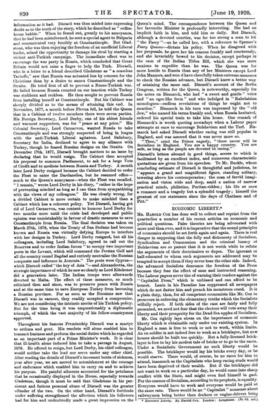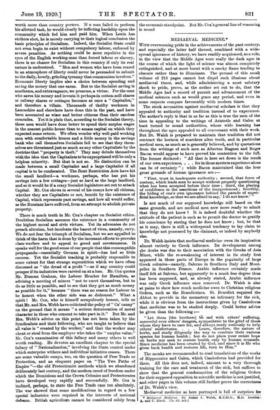ECONOMIC LIBERTY.* MR. HAROLD Cox has done well to collect
and reprint from the quarterlies a number of his recent articles on economic and political questions. False theories are being advocated with more zeal than ever, and it is imperative that the sound principles of economics should be set forth again and again. There is real danger in supposing that the folly and dishonesty of Socialism,• Syndicalism and Communism and the criminal lunacy of Bolshevism are so patent that it is not worth while to refute the arguments of their doctrinaires or dupes. The ignorant or half-educated to whom such arguments are addressed may be tempted to accept them if they never hear the other side. Indeed, the advanced Socialists denounce the freedom of the Press because they fear the effect of sane and instructed reasoning. The Labour papers never tire of warning their readers against the Capitalist Press," which is unbiased and can afford to be honest. Lenin in his Paradise has suppressed all newspapers which do not flatter him and preach his monstrous creed. It is a plain duty, then, for all competent economists like Mr. Cox to persevere in enforcing the elementary truths which the Socialists wilfully reject. If both aides of the case are fairly and fully presented, we need not fear that the electors will vote away their liberty and their prosperity for the Dead Sea apples of Socialism.
Mr. Cox rightly lays stress on. the importance of economic liberty which is obtainable only under our existing system. In England a man is free to work or not to work, within limits. An ex-soldier is not indeed free to work as a bricklayer, lest new houses should be built too quickly. But a fully-licensed brick- layer is free to lay his modest tale of bricks or to go to the races. Under a Socialistic Government no such liberty would be possible. The bricklayer would lay his bricks every day, or he would starve. There would, of course, be no races for him to attend, inasmuch as the Capitalists who keep racing studs would have been deprived of their wealth. But if the bricklayer did not want to work on a particular day, he would come into sharp conflict with the State, and might even find himself in gaol. For the essence of Socialism, according to its prophets, is equality. Everyone would have to work and everyone would be paid at the same rate. There would be no " Capitalist " nonsense about railwaymen being better than dockers or engine-drivers being
• Economic Liberty. By Darold Cox. London : Longman. [73. ed. net..1 worth more than country porters. If a man failed to perform his allotted task, he would clearly be inflicting hardship upon the community which fed him and paid him. When Lenin has strikers shot, he is merely carrying to their logical conclusion the basic principles of Socialism. Indeed, the Socialist State could not even begin to exist without compulsory labour, enforced by severe penalties. As nothing could be more repulsive in the eyes of the English working-man than forced labour or slavery, there is no chance for Socialism in this country if only its real nature is understood. " Men and women who have been reared In an atmosphere of liberty could never be persuaded to submit to the daily, hourly, grinding tyranny that communism involves." Economic liberty implies also a choice between spending and saving the money that one earns. But to the Socialist saving is anathema, and extravagance, we presume, a virtue. For the man who saves his money and invests it perhaps-in cotton-mill shares or railway shares or cottages becomes at once a " Capitalist," and therefore a villain. Thousands of thrifty workmen in Lancashire and elsewhere have done this in the past, and have been accounted as wiser and better citizens than their careless comrades. Yet it is plain that, according to the Socialist theory, these men would have done better to spend their surplus wages in the nearest public-house than to amass capital on which they expected some return. We often wonder why well-paid working men with comfortable homes and a little money in the savings bank who call themselves Socialists fail to see that they them- selves are threatened just as much as any other Capitalists by the doctrine that "property is theft." They may delude themselves with the idea that the Capitalists to be expropriated will be only a helpless minority. But that is not so. No distinction can be made between a small Capitalist and a large Capitalist if all capital is to be confiscated. The Rent Restriction Acts have hit the small landlord—a workman, perhaps, who has put his savings into a few cottages—just as hard as the large landlord, and so it would be if a crazy Socialist legislature set out to attack Capital. Mr. Cox shows in several of his essays how all citizens, whether they are Capitalists or not, benefit by the existence of Capital, which represents past savings, and how all would suffer, as the Russians have suffered, from an attempt to abolish private proPerty- There is much truth in Mr. Cox's chapter on Socialist ethics. Doubtless Socialism assumes the existence in a community of the highest moral and civil) virtues. Yet its advocates do not preach altruism, but inculcate the basest of vices, namely, envy. We do not fear the triumph of Socialism, but we are appalled to think of the harm that is done by the incessant efforts to provoke class-warfare and to appeal to greed and covetousness. It speaks well for the good sense of our people that this contemptible propaganda—essentially German in spirit—has had so little success. Yet the Socialist teaching is probably responsible to some extent for that strange superstition which we have often discussed as " the dread of a profit "—as if any country could prosper if its industries were carried on at a loss. Mr. Cox quotes Mr. Duncan Graham, the Labour Member for Hamilton, as advising a meeting of miners " not to exert themselves, but to do as little as possible, and to see that they got as much money as possible for it," because " there was no reason for Labour to be honest when the other side was so dishonest." What a spirit ! Mr. Cox, who is himself scrupulously honest, tells us that Mr. and Mrs. Webb have criticized the policy of " Ca' canny" on the ground that it means " a serious deterioration of moral character in those who consent to take part in it." But Mr. and Mrs. Webb's advice on this point has not been taken by the Syndicalists and their following, who are taught to believe that all value is " created by the worker," and that the worker may cheat or steal from the employer who takes the " surplus value." Mr. Cox's examination of this fallacy and many others is well worth reading. He devotes an excellent chapter to the special fallacy of " Nationalisation," involving the State control under which enterprise withers and individual initiative ceases. There are some valuable essays, too, on the question of Free Trade or Protection, and an eloquent paper on " The Two Paths of Empire "—the old Protectionist methods which we abandoned deliberately last century, and the modern creed of freedom under which the Dominions and the Crown Colonies and Protectorates have developed very rapidly and successfully. Mr. Cox is inclined, perhaps, to state the Free Trade case too absolutely. The war showed that some modifications in regard to a few special industries were required in the interests of national defence. British agriculture cannot be considered solely from
the economic standpoint. But Mr. Cox's general line of reasoning is sound







































 Previous page
Previous page